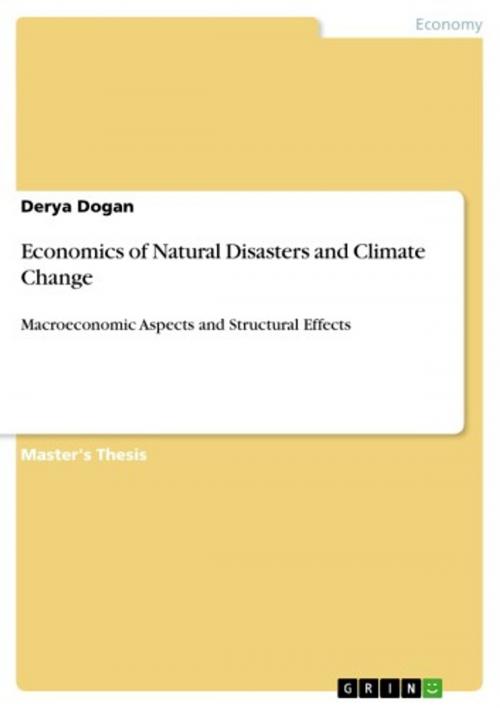Economics of Natural Disasters and Climate Change
Macroeconomic Aspects and Structural Effects
Business & Finance, Economics, Macroeconomics| Author: | Derya Dogan | ISBN: | 9783656363569 |
| Publisher: | GRIN Verlag | Publication: | January 31, 2013 |
| Imprint: | GRIN Verlag | Language: | English |
| Author: | Derya Dogan |
| ISBN: | 9783656363569 |
| Publisher: | GRIN Verlag |
| Publication: | January 31, 2013 |
| Imprint: | GRIN Verlag |
| Language: | English |
Master's Thesis from the year 2012 in the subject Economics - Macro-economics, general, grade: 1,3, University of Wuppertal (Schumpeter School of Business and economics), course: VWL, Makroökonomie, language: English, abstract: During past centuries, natural disasters occurred more often in our environment and caused more serious damage worldwide. The Hurricane Irene in the Caribbean and the USA, the floods in Australia, the earthquake in New Zealand and especially in Japan in 2011 had enormous extends concerning the caused loss and damages in the specific regions. Within the past four decades, the frequency of large natural disasters raised three times more. Furthermore, the economic losses - after adjusting for inflation - increased even eight times more compared to the past decades. This also has a great impact on the insurance industry, since the insured losses increase even in a larger amount compared to other factors affected by natural disasters. However, the insurance industry uses in spite of these unfavorable loss trends, a wide range of coverage against disasters such as Cat Bonds to transfer the disaster risk, and to avoid unnecessary expenses. Climate change also plays a big role in the frequently occurring amount of disasters. Since it is still hard to estimate the impacts of future climate changes for the frequency and intensity of natural disasters with its huge losses, new policies such as Green Growth have been introduced for mitigation effects. The purpose of this thesis is to represent and describe the economics of natural disasters due to climate change with its macroeconomic aspects and structural effects. While demonstrating the impacts on natural disasters to a region's economy, it is important to know that many other factors are linked with natural disasters that have an effect on a region's economy. Therefore, after defining the important terms in the first section of this thesis, the scope and costs of natural disasters will be illustrated in chapter 2 for a better demonstration of the disaster events impacts in general. This will start by describing the reasons for climate change to demonstrate in the latter the increasing number of disaster appearances due to the effects of climate change. Different regions will be considered within this analysis, whereas in the following sections only the regions which are economically vulnerable to natural disasters will be taken into account to illustrate the costs of natural disasters........
Master's Thesis from the year 2012 in the subject Economics - Macro-economics, general, grade: 1,3, University of Wuppertal (Schumpeter School of Business and economics), course: VWL, Makroökonomie, language: English, abstract: During past centuries, natural disasters occurred more often in our environment and caused more serious damage worldwide. The Hurricane Irene in the Caribbean and the USA, the floods in Australia, the earthquake in New Zealand and especially in Japan in 2011 had enormous extends concerning the caused loss and damages in the specific regions. Within the past four decades, the frequency of large natural disasters raised three times more. Furthermore, the economic losses - after adjusting for inflation - increased even eight times more compared to the past decades. This also has a great impact on the insurance industry, since the insured losses increase even in a larger amount compared to other factors affected by natural disasters. However, the insurance industry uses in spite of these unfavorable loss trends, a wide range of coverage against disasters such as Cat Bonds to transfer the disaster risk, and to avoid unnecessary expenses. Climate change also plays a big role in the frequently occurring amount of disasters. Since it is still hard to estimate the impacts of future climate changes for the frequency and intensity of natural disasters with its huge losses, new policies such as Green Growth have been introduced for mitigation effects. The purpose of this thesis is to represent and describe the economics of natural disasters due to climate change with its macroeconomic aspects and structural effects. While demonstrating the impacts on natural disasters to a region's economy, it is important to know that many other factors are linked with natural disasters that have an effect on a region's economy. Therefore, after defining the important terms in the first section of this thesis, the scope and costs of natural disasters will be illustrated in chapter 2 for a better demonstration of the disaster events impacts in general. This will start by describing the reasons for climate change to demonstrate in the latter the increasing number of disaster appearances due to the effects of climate change. Different regions will be considered within this analysis, whereas in the following sections only the regions which are economically vulnerable to natural disasters will be taken into account to illustrate the costs of natural disasters........















